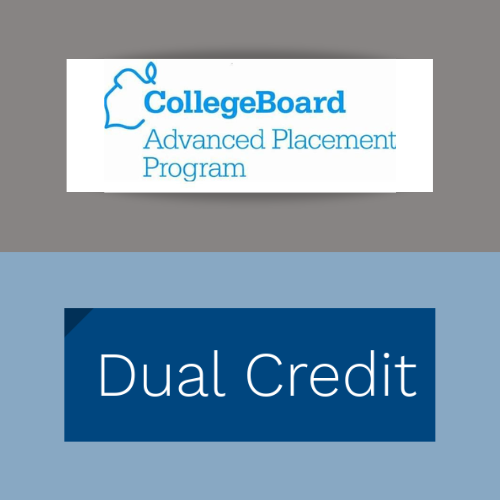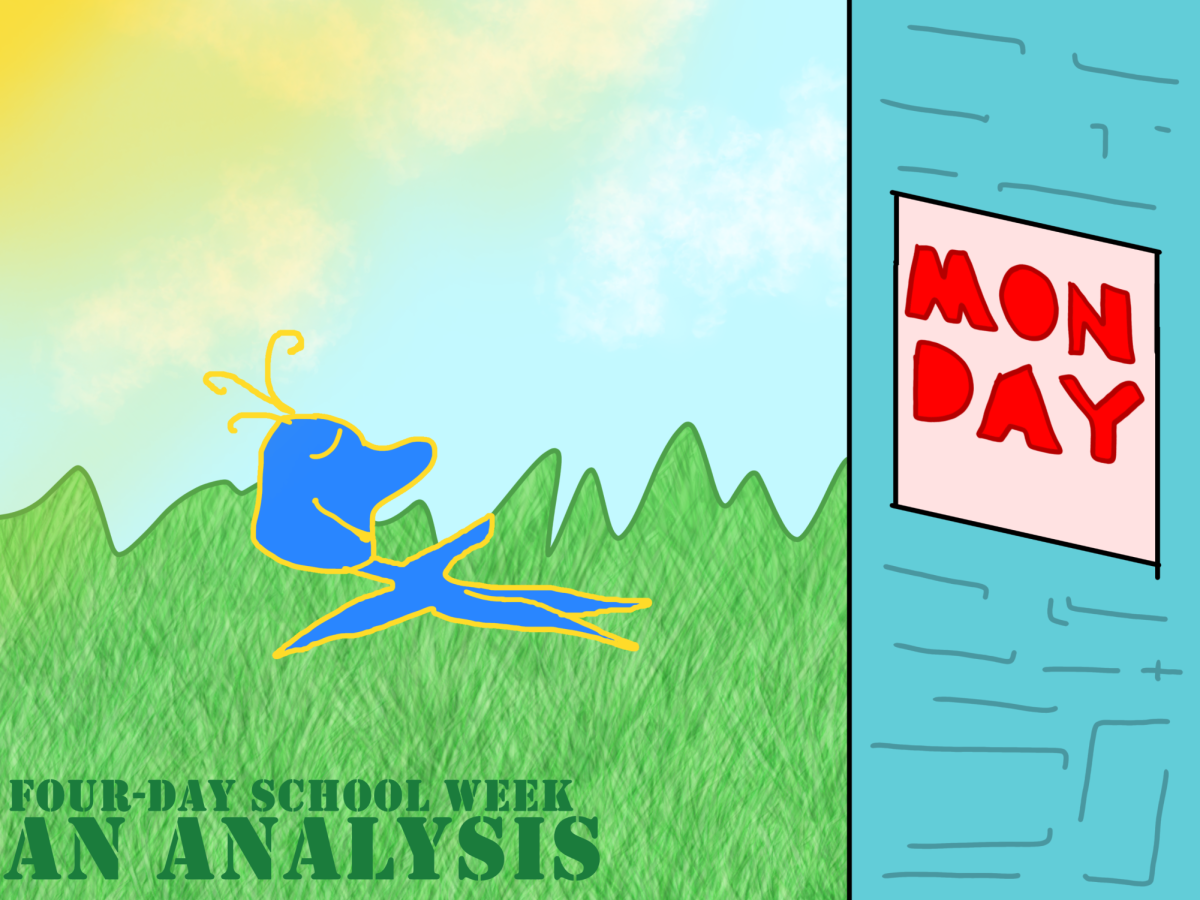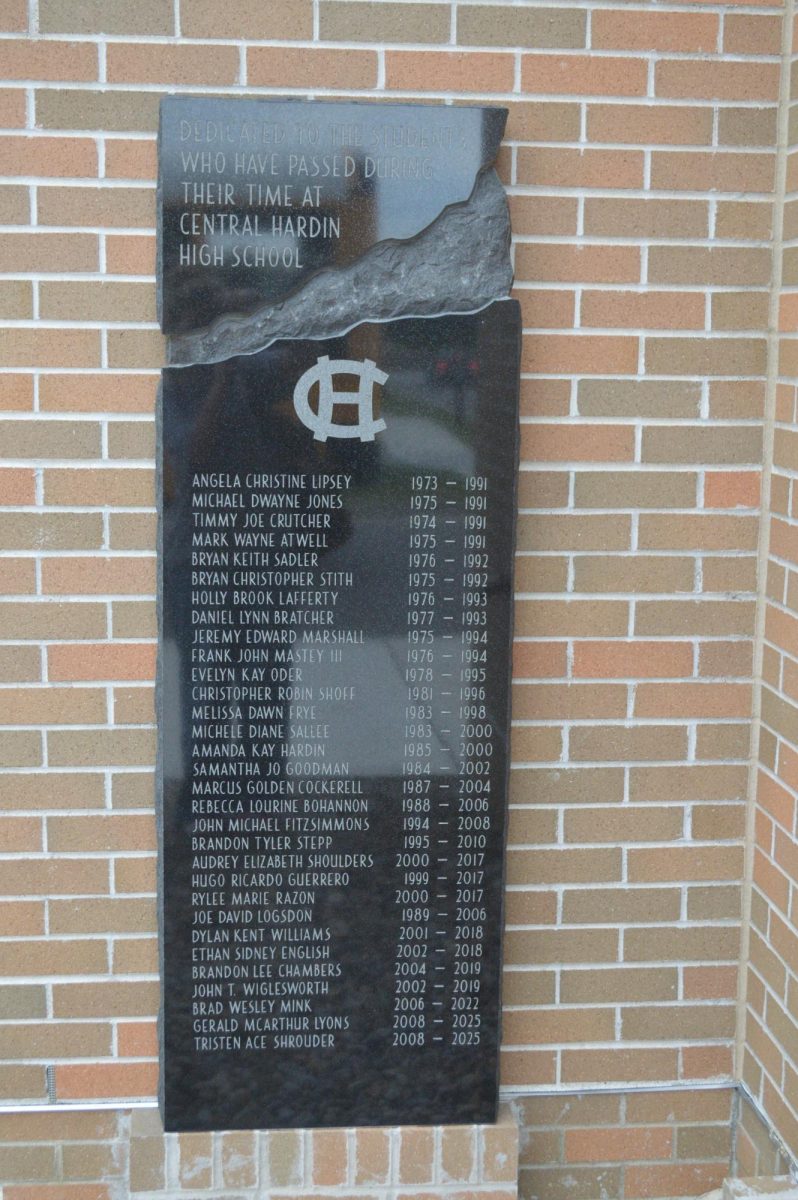Central Hardin’s Avant-Garde Academics: A Breakdown
The Ins, Outs, Pros, Cons, and In-Particulars of AP and DC Courses

Advanced Placement and Dual Credit Graphic
December 15, 2022
For those unfamiliar with the Advanced Placement (AP) and Dual Credit (DC) curriculums, it can often be assumed that the classes are nearly impossible to pass, that the workload is never ending and unmanageable. Although there is a significant difference between the requirements of a base-level high school class and per say an AP or DC course, there are serious longstanding benefits both educationally and personally to putting in the extra effort, and it may prove much easier than first stigmatized.
Advanced Placement
Here at Central Hardin, there are nine different AP courses offered to students. These include:
- AP Chemistry, taught by LeAnn Blair
- AP Environmental Science, taught by Tina Cox
- AP Calculus, taught by Samantha Dougherty
- AP Biology, taught by Jared Eaton
- AP English Literature, taught by Kayla Ernst
- AP Physics I & II, taught by Charles Pearsall
- AP Computer Science Principles, taught by Russell Pike
- AP US Government & Politics, taught by Rachel Wilson
- AP Statistics, taught by April York
So what does an AP class entail, and what is the incentive to take these courses?
In summary, Advanced Placement is a program in the United States and Canada created by the College Board which offers college-level curriculum to high school students. American colleges and universities may grant placement and course credit to students who obtain high scores on the exams at the end of the course.
“With AP, there’s a test you take at the end. Basically, how they do that grading is: getting a 5 on the AP exam is supposed to be equivalent to making an A in the college class. Getting a 4 is like getting a B; getting a 3 is like getting a C,” AP Calculus teacher Samantha Dougherty explained. “So that’s why colleges accept 3s and above. Now, if you’re in specific programs, they may want you to have a 4 or a 5 to get credit; which makes sense because they want to make sure you really understand it.”
Additionally, with the program being national, “the AP standards that we teach here are the AP standards they teach in California, New York, Washington; everywhere it’s all the same.”
With this uniformity, there are plentiful resources uniform to every AP course accessible both online and in print. The content is formatted in units and can be previewed and studied through the College Board website. However, taking an AP class in a high school environment makes it seem no different in routine to a normal course schedule. Any teacher who chooses to educate students using an AP curriculum is willing to follow a strict regime and offer additional help, knowing that for high school students, college-level content will be challenging.
“If you think about when you’re in college, you go to class 3 hours a week; that’s the amount of instruction you get. Here, you get 5 plus hours a week,” Dougherty stated.
Another key point is “the advantage of having a high school teacher teaching the class; we focus on teaching. Like college algebra for example. It’s probably not a professor who is going to teach it; it’s probably a graduate student. They call them TA’s (teacher’s assistants), and their focus is not teaching. Their focus is research and working on their graduate degree. Here, Ms. Russell’s focus is her college algebra kids, she makes it a priority.”
For those who are taking or have taken an AP class at Central Hardin, the experiences have been overwhelmingly positive.
“AP can be challenging, but it is the most rewarding thing I did in high school—I came into college with enough credits to pursue a bachelor’s degree AND master’s degree in four years total,” a University of Alabama student told AP representatives.
“AP classes in general are a fantastic way to challenge yourself and prepare you for college. The knowledge you gain from AP Gov specifically is extremely important and you will actually apply this knowledge after high school,“ sophomore student Ellie Dick shared. “Having a strong understanding of our government is extremely important in this day and age because of the massive divide in our country. AP Gov gives students the knowledge to make strong and logical arguments. We all know that our government has flaws and AP Gov gives us the resources to consider why things are the way they are and how we can fix them.”
Advanced Placement courses are an above-and-beyond method to understanding the rigor of college-level content. It’s less about completing an additional load of homework, and more targeted towards learning how to problem solve and effectively manage the puzzle pieces of one’s schedule both academically and socially.
Moreover, research has shown that students who take AP courses and exams are more likely than their peers to attend college and graduate on time. Even AP Exam scores of 1 or 2 predict better college outcomes than academically similar college students who didn’t participate in AP.
“There’s a lot of power in the 2. A 2 will get you in the door. Most places it doesn’t get you the credit, but it shows colleges that you’re ready for rigorous coursework,” Virginia AP English Language and Composition Teacher Timothy Towslee conveyed on the AP website.
Both on a national and Bruin-wide basis, the benefits of taking AP classes are vast and varied. Of course, they may not be for everyone, but it is highly recommended and encouraged by both students and teachers to give one a try while still given the opportunity.
Dual Credit
Here at Central Hardin, there are around seven different DC courses offered to students. These include:
- DC English 101 & DC English 102, taught by Angela Cannon and Bill Newsome
- DC ED 220 Learner Community, DC ED 300 Learner Centered Classroom, & DC ED 325 The Prof Educator, taught by Chase Cruse
- DC ENG 161 Literary Studies & DC MAC 120 Public Speaking, taught byKayla Ernst
- DC Physics 141 & DC Physics Lab 143, DC Physics 142 & DC Physics Lab 144, taught by Charles Pearsall
- DC MAT 150 College Algebra, taught by Vivian Russell
- DC History 108 & DC History 109, taught by James Sisk
- DC CIT 105 Digital Literacy, taught by Jon and Tiffany Spratt
- Agriculture Courses, taught by Jayna Thompson
Given that Dual Credit is separate and unique from other classes, what does one entail, and how does it differ from AP?
According to the Kentucky Department of Education, students can enroll in a course which allows him/her to earn high school credit and college credit simultaneously, hence the name Dual Credit. This course may be taught on a college campus or on a high school campus, but it will be in conjunction with a college or university.
The coursework offered for a particular class may differ from college to college, for the DC programs are not nationally uniform. However, it is important to note that if one does enroll in a college course in high school, the grade they receive in that class will go on their college transcript. In a sense, one will have two grades at the conclusion of the class; a high school one and a college one, and they may not be the same depending on the grading scale.
“I think sometimes students think, ‘my GPA in college doesn’t matter as much because a degree is a degree, but more and more careers are requiring Master’s Degrees, or more certifications after an Undergrad,” Dougherty articulated. “You have to apply for those programs and you need scholarships for those things; there’s requirements…so your GPA in college does matter.”
Whether one decides to take a DC class or not, colleges and universities look to GPA and courses taken when analyzing applications. The effort you put in while still in the classroom is oftentimes reflected on your transcript, and if you wish to impress admission officers, adding a the DC title can up the chance of acceptance and scholarship. Officials love to see that students took on the additional challenge of college-level rigor while still in high school, even if your final grade in that class isn’t an A+. Work hard, try your best, manage your time, and the odds will forever be in your favor.
“I think sometimes too there’s this mentality that it’s just a ton of homework and that’s all that you think about with AP and Dual Credit, but I think a lot of us are making it very manageable,” Dougherty said. “I know right now in AP Calculus and Dual Credit Physics, we have football players, soccer players, we have track…and in a lot of those higher-level classes, the homework isn’t necessarily due every day, we do it more in the college style where it’s due one time a week.”
Central Hardin’s AP and DC instructors want their students to exceed. The content will be challenging, the deadlines strict, and the expectations high, but the teachers are there to help, tutor, and root for you. After taking an AP or DC class, you will have been exposed to a whole new genre of academic austerity, and will be a leg above those who have not when it comes to transitioning into college.
“AP Calculus is a great way to challenge and enhance your learning. This course better prepares you for the rigorous nature of college classes and establishes a solid foundation of knowledge that will follow you throughout your academic journey,” senior Serena Mcneilly voiced.
“Students should take Dual Credit English not only because it’s helpful to get it out of the way while still in high school, but it also challenges you to do better as a writer. Personally, taking Dual Credit English has taught me so much about different writing styles,” junior Meadow McGimsey vocalized. “I’ve never written a literary analysis before and I cannot remember the last time I’ve written a decent narrative essay. I highly recommend taking classes like this because overall, it’s good for you and an excellent learning experience.”
If you are interested in enrolling in an AP or DC course at Central Hardin for the 2023-24 school year, talk to your counselor for more information. You are also encouraged to speak with any of the specified teachers listed above or contact students who have previously taken the class; their guidance and insight will offer detail unique to their experience.
















